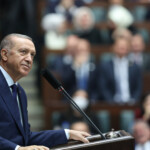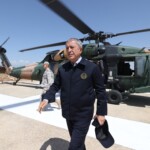‘Aside from inflaming tensions with Israel and perhaps sparking a wider regional war, there is also concern that Erdoğan could use the conflict as cover to continue attacking the Kurdish people.’
The October 7 attack by Hamas against Israel has led Israeli Prime Minister Benjamin Netanyahu to announce his country is at war. While millions of people across the globe have flocked to the streets in protest of the civilian toll of the conflict, the US administration has been primarily concerned with confining the fighting to within the borders of Israel and Gaza, simultaneously preparing for a spillover that could potentially engulf the whole region in violence.
The concern that the Israel-Hamas war could turn into a region-wide conflict is a worst-case scenario for many Middle East watchers, with most pointing to the Islamic Republic of Iran as the dynamic force behind any such escalation. As of now, Lebanese Hezbollah has been engaging in limited skirmishes on Israel’s northern border, and American military bases have been targeted by Iran-backed groups in Iraq and Syria with retaliatory US airstrikes not far behind.
Last month, White House spokesman John Kirby said, “We know that Iran is closely monitoring these events, and in some cases, actively facilitating these attacks and spurring on others who may want to exploit the conflict for their own good, or for that of Iran.”
Iran’s relationship with Hamas and Hezbollah as part of its “axis of resistance” is well documented and reported on. One of the pivotal questions going forward is whether the next phase of Israel’s war against Hamas could trigger a more direct response from the Iranian proxy’s main patron.
Hamas’ other main state backers are Qatar and Turkey. Qatar provides Hamas with notable funds and political support, while Istanbul — Turkey’s biggest city — has become an international hub for the group, with Ankara issuing Turkish passports for Hamas leaders to travel freely in the region and beyond. Both countries remain committed to their relationship with an entity that is deemed a terrorist organization by the United States and many European countries, but one aspect has separated them in their approach post October 7. Qatar’s ruling class has so far distanced itself from Hamas’ attack, and other than continuing to support the organization in Gaza, does not have the desire, let alone the operational capacity to escalate beyond. Turkish politicians, who have openly celebrated “Operation Al-Aqsa Flood,” are conducting themselves differently, to say the least.
After initially adopting a relatively de-escalatory tone, seemingly intent on establishing itself as a potential mediator between Israel and Hamas, the Turkish government has drastically hardened its rhetoric. Turkish President Recep Tayyip Erdogan brushed aside the rawness of emotions after Hamas’ October 7 attack and told lawmakers in a televised speech that “Hamas is not a terrorist group, it is a group of liberators who protect their land.”
Speaking at a mass rally organized by his party last month, Erdogan said Israel was committing “genocide” by targeting civilian infrastructure such as hospitals and power facilities. “Israel, we will also declare you as a war criminal to the world, we are preparing for it, and we will introduce Israel to the world as a war criminal,” he proclaimed to a fired-up crowd of hundreds of thousands.
In recent years, the Turkish government has been noticeably activist in its regional military posture, entering active theaters from Libya to Nagorno-Karabakh and consistently pummeling Kurdish forces in Iraq and Syria. The Iraq war, the 2015 coup attempt, ISIS, and tensions in the Eastern Mediterranean have all contributed to a mutual distrust and contempt between Ankara and Washington. Turkish officials at the highest level, including Erdogan himself, have stated that they intend to kick the US out of the region altogether. Erdogan slammed the deployment of US aircraft carrier strike groups to the Eastern Mediterranean, which came after Israel’s declaration of war against Hamas.
While Erdogan cannot effectively play the mediator role on the Israeli-Palestinian conflict and thus cannot use it to extract concessions from either of the emerging blocs in the new great power competition — as he has done to Turkey’s advantage in the Russia-Ukraine war — he can use the conflict to escalate in Syria in several ways.
Turkish media has begun to baselessly accuse Israel of recruiting Syrian Kurds to fight in Gaza, a strategy designed to stir up anti-Kurdish sentiment and build support for potential military intervention. This form of propaganda could allow Erdogan to use aggression in Syria to align with public demands to support Palestinians — without having to offer any real relief to civilians in Gaza or plan for Israeli-Palestinian peace.
Aside from inflaming tensions with Israel and perhaps sparking a wider regional war, there is also concern that Erdogan could use the conflict as cover to continue attacking the Kurdish people, something my organization has warned about for years.
Some academics do not like Turkey’s irredentist foreign policy to be labeled as “neo-Ottomanist,” and that may indeed be an over-simplification, but there are only a certain number of times a leader can invoke an imperial past after which you should take him at his word.
“Just a century ago, Gaza was for this nation and this country what Adana was. Just as Skopje was what Edirne was, Thessaloniki was what Kırklareli was, Mosul was what Mardin was, Aleppo was what Gaziantep was, Gaza was an inseparable part of the homeland that we know,” the Turkish president’s recent post on X reads.
If Washington is adamant on preventing a wider regional conflict, it needs to make sure it keeps both Iran and Turkey in check.
____
Giran Ozcan is the Executive Director of Kurdish Peace Institute, based in Washington, DC. He has previously worked with the Peoples’ Democratic Party (HDP) in its overseas representative offices and was the HDP Representative to the United States of America between 2017-2021.
This article was originally published by The Algemeiner.
The views and opinions expressed above are those of the author(s) and do not reflect those of the Free Turkish Press.


